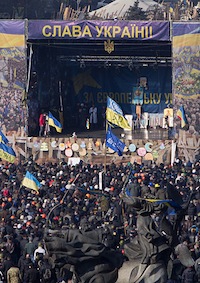A Young Brazilian in London
State of Fear: Illiberal impulses in democratic states.
February 26, 2014

Dedicated to the memory of Jean de Menezes, a young Brazilian, who was killed on July 22, 2005 in London by British police.
Jean de Menezes was unarmed, walking peacefully in broad daylight. He had made no threat to anybody and had not been asked by police who he was.
Yet, on that day in July 2005, he was shot in the head by counter-terrorist weapons officers seven times. According to a legal adviser to the London Metropolitan Police, the hollow-point bullets that took his life have been banned from use in warfare by the Hague Declaration, already in place more than a century.
More than eight years later, that horrific act still chills me to the bone.
Menezes’s “mistake” was to walk out of an apartment building which was under surveillance by anti-terrorist police. It was two weeks after the 7/7 London bombings on three underground trains and one bus.
The day before he left his apartment for a final time, on July 21, 2005, there had been a failed copycat bombing and the would-be suicide bombers had fled. So London’s Metropolitan Police were undoubtedly nervous as they launched a massive manhunt.
As Menezes exited the building, the police identified him – on the flimsiest of evidence and with no sensible procedure – as one of the terrorists from the failed bombing attempt.
Judge, (no) jury and executioner
Because he then made the deadly “mistake” of boarding an underground train, the police assessed he was going to blow it up. They jumped on him and killed him.
At no point did any police officer challenge him to ask him who he was or what he was doing. In other words, they made no attempt to reconfirm the rushed identification they had made as he left the building, in the entire time he was traveling (on foot and by two different buses) from there to the train where he ended up being killed.
The most puzzling fact is that when they killed him, the London police were looking for three people of Somali or Ethiopian origin. Given that, it remains unexplained why the police thought that Menezes, with distinctly Caucasian appearance, was one of the suspects they were seeking.
Several eyewitnesses actually identified the victim from their fleeting glance before the shooting as Asian in appearance.
Protecting the system — or the citizen?
There was an attempt by the Police Commissioner (not challenged by the British government) to dismiss the shooting as a tragic inevitability of the moment.
Yet, the 2005 killing of Menezes by London Police was a premeditated act and not one that occurred accidentally in the heat of action. They were monitoring his building and then followed him all the way to the station and onto a train, where they restrained him and shot him in the head seven times, according to two official investigations.
In ways that are sadly all too familiar in today’s Britain, London Metropolitan Police Commissioner Ian Blair sought to prevent a public investigation on the grounds that sensitive anti-terrorists methods would be compromised.
The list of resisted or white-wash investigations that were eventually subjected to reasonable public scrutiny is long: Bloody Sunday in 1972, the decision in 2003 to invade Iraq to eliminate its non-existent WMD, the death of WMD scientist David Kelly on 18 July 2003, phone hacking by News of the World, pleb-gate and repeat sexual predation on young people by celebrities.
So much for the famed British sense of fairness. So much for the claim of acting rationally. And so much for the duty of the police to protect the peaceful exercise of liberty.
In 2008, within six months of coming to office, the new mayor of London, Boris Johnson, pressured Commissioner Blair to resign.
According to the BBC, by the time the Commissioner resigned, he had also overseen a raft of other controversial operations, including the recording of a government minister’s conversation. Blair had also come under fire for suggesting that the murder of two young girls should not be the top news story in the country.
Moreover, in 2006 the police had again shot and (that time) wounded an unarmed terrorist suspect who was later cleared of any wrongdoing – an indication London Police learned little from the Menezes tragedy the year before.
Upon the Commissioner’s resignation, UK Prime Minister Gordon Brown and his Home Office Secretary, Jacqui Smith, commended Ian Blair’s service. He would eventually be appointed to the House of Lords. Evidently, the government felt protective of the force and duty-bound to protect an increasingly unaccountable state apparatus.
Worse, the U.K.’s “shoot to kill” policy for terrorist suspects in certain circumstances remains in place. On May 11, 2011, the Metropolitan Police approved regular use of the hollow point bullets banned from war in several of their weapons – the same bullets used to kill Menezes.
Yes, it is not just they, but all of us including those beyond Britain’s borders who should worry. Both the accidental assassination of Menezes and the subsequent lack of concern shown by the British government for the need to protect citizens from police mistakes with fatal consequences reveal the darker side of government.
A sub-element of this argument is that the impulse is more often seen when “foreigners” or “part foreigners” are involved. This was revealed in the Menezes case when police briefed reporters (falsely) that Menezes was in the UK illegally. It was as if they wanted to hint that police culpability might somehow be diminished if Menezes were an illegal resident.
To the credit of at least one minister in the British government, Foreign Secretary Jack Straw was prepared to contradict the police at the time and assert his belief that Menezes was in the UK legally. But it was still an irrelevant fact.
The handling of the Menezes case, like other political scandals in British public life in recent years, demonstrates that governments and parliaments in the most advanced liberal democracies can from time to time fall victim to an ugly impulse to be blind to long established principles for the protection of their citizens. This has been true in the United States as well.
Takeaways
The 2005 killing of Menezes by London Police was a premeditated act and not an error in the heat of action.
So much for the famed British sense of fairness and the duty of the police to protect peaceful liberty.
The accidental assassination of Menezes and the subsequent lack of concern reveal the ugly side of government.
Read previous

Ukraine’s Global Meaning: Four Theses
February 25, 2014
